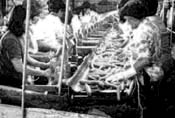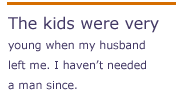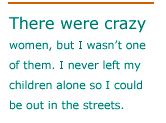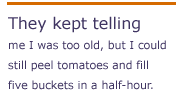Luisa Garza
by Daniela Guardiola and Cindy Lee Perezr
Luisa Garza, a 101-year-old Elsa resident, was interviewed at the Con Cariño Adult Day Care Center in Elsa, Texas, by Daniela Guardiola and Cindy Lee Perez, students in Delia Perez’s sophomore World History class at Edcouch-Elsa High School.
![]() y
name is Luisa Garza. I am 101 years old. Don’t even ask me when I
was born because I can’t remember. You can tell me something and
if I turn around, I forget everything. I don’t have my faculties
like I did before.
y
name is Luisa Garza. I am 101 years old. Don’t even ask me when I
was born because I can’t remember. You can tell me something and
if I turn around, I forget everything. I don’t have my faculties
like I did before.
 I
have lived in Rio Grande City, Beeville, Alice, Mercedes, Chicago, and
here in Elsa, Texas. All the towns I lived in, I have worked in. I worked
at sewing. I would make dresses for brides and ladies. Now I can’t.
I can’t do it. There were only three in my family, one son and two
daughters. The oldest doesn’t know anything. She is like me. She
can’t walk, she doesn’t come often to see me at my house. But
we take care of ourselves. I learned that from my father and my mother.
Because we were many and only one of my parents was the worker--that was
my father. My mother could not work, because she had so many in the family
to take care of. How was she supposed to work?
I
have lived in Rio Grande City, Beeville, Alice, Mercedes, Chicago, and
here in Elsa, Texas. All the towns I lived in, I have worked in. I worked
at sewing. I would make dresses for brides and ladies. Now I can’t.
I can’t do it. There were only three in my family, one son and two
daughters. The oldest doesn’t know anything. She is like me. She
can’t walk, she doesn’t come often to see me at my house. But
we take care of ourselves. I learned that from my father and my mother.
Because we were many and only one of my parents was the worker--that was
my father. My mother could not work, because she had so many in the family
to take care of. How was she supposed to work?
 We were very poor. I’m still poor. Just imagine. We were five boys
and seven girls for one worker. How do you think he raised us? I’ve
always been poor. My parents, Bernabé Fuentes and Dionicia Hernández,
were always poor. And we were many. The only schooling we got was in the
fields. That was the school that our parents made us go to. We cut cane,
corn, we fished, we did everything ourselves. That was the school where
I learned. When I was growing up, things that we have today didn’t
even exist. There were no doctors, there were no priests, and there was
no church. There was nothing. It was all work.
We were very poor. I’m still poor. Just imagine. We were five boys
and seven girls for one worker. How do you think he raised us? I’ve
always been poor. My parents, Bernabé Fuentes and Dionicia Hernández,
were always poor. And we were many. The only schooling we got was in the
fields. That was the school that our parents made us go to. We cut cane,
corn, we fished, we did everything ourselves. That was the school where
I learned. When I was growing up, things that we have today didn’t
even exist. There were no doctors, there were no priests, and there was
no church. There was nothing. It was all work.
I had six children, three lived, three died. My husband worked when he felt like it. He was lazy when it came to work. When I had just had my last girl, my husband went to Mexico with his cousin, and he never returned. The kids were very young when my husband left me. He left me when I was still very innocent. He never returned, and I struggled to finish raising my children. I haven’t needed a man since my husband left. Besides, nowadays there are no real men left.
![]() n
those days, when the cotton season was over, the owners did not want old
cotton sacks that were torn. The torn ones they burned. I would follow
the truck and take the torn sacks home and sew them up and paint them
and make clothes for my children. I would go and put little pieces of
a plant in the water with the sacks to color them. You put the sacks in
a tub of water with the plants, and it would color them.
n
those days, when the cotton season was over, the owners did not want old
cotton sacks that were torn. The torn ones they burned. I would follow
the truck and take the torn sacks home and sew them up and paint them
and make clothes for my children. I would go and put little pieces of
a plant in the water with the sacks to color them. You put the sacks in
a tub of water with the plants, and it would color them.
 I raised my children in La Villa. Lots of people there knew I did a lot
of things. Whatever was asked of me I did. I made tamales, empanadas,
and tortillas, and my youngest child would go out on the streets and sell
so that I could feed them and dress them. There in La Villa, I had a lot
of female friends that helped me support my family. And then my children
got married, and I went back to work in the packing shed. Then my son,
the only one I have, moved my house from La Villa to Elsa, so I could
be close to work.
I raised my children in La Villa. Lots of people there knew I did a lot
of things. Whatever was asked of me I did. I made tamales, empanadas,
and tortillas, and my youngest child would go out on the streets and sell
so that I could feed them and dress them. There in La Villa, I had a lot
of female friends that helped me support my family. And then my children
got married, and I went back to work in the packing shed. Then my son,
the only one I have, moved my house from La Villa to Elsa, so I could
be close to work.
I never went anywhere. I didn’t have time to go out or have friends. How could I? If sometimes I went out with a friend, I would look for something for my daughters, so they could eat and dress. I was never a crazy woman. There were crazy women, but I wasn’t one of them. I never left my children alone so I could be in the streets. Now that I’m old, I’m finally getting money. And now I’m waiting for some men to fix my house, because my house is too broken down. I have suffered too much.
 I
worked in Chicago for many years, but I also worked in the fields for
many more years. I worked at the Vahl’sing packing shed when it was
just starting. We started when it was just a canvas tent. I worked there
for years. Then they brought all the machines. From there on, they kept
bringing machines everyday and putting canvas on top. So when it rained,
we worked under the canvas.
I
worked in Chicago for many years, but I also worked in the fields for
many more years. I worked at the Vahl’sing packing shed when it was
just starting. We started when it was just a canvas tent. I worked there
for years. Then they brought all the machines. From there on, they kept
bringing machines everyday and putting canvas on top. So when it rained,
we worked under the canvas.
One time the Border Patrol came to the Vahl’sing shed and took most of the workers. Only four of us were left. All the rest were sent back to Mexico because they were from Mexico. But in the morning they had all returned. The Border Patrol would just leave them there on the bridge on the other side. But they just crossed over.
![]() stopped
working at the shed because we were told that it was going to close down.
The reason that the shed closed was because the main owner died. He left
it with another man, and he let it go. He didn’t pay, and then he
began to allow this and that to happen and the shed finally closed. When
the shed closed, the company sold all the machines and the tools to Mexico.
We suffered because we couldn’t earn money. I cried when I heard
the packing shed was going to close. I cried, because I did not know what
we were going to do.
stopped
working at the shed because we were told that it was going to close down.
The reason that the shed closed was because the main owner died. He left
it with another man, and he let it go. He didn’t pay, and then he
began to allow this and that to happen and the shed finally closed. When
the shed closed, the company sold all the machines and the tools to Mexico.
We suffered because we couldn’t earn money. I cried when I heard
the packing shed was going to close. I cried, because I did not know what
we were going to do.
 One of the owners of the shed was a very good man. He is the one who got
me my Social Security number. But then one day a woman said they didn’t
need any more employees. And they told me there was no work. And then
I asked the man, “What am I going to do? I don’t have a husband
that can help me. If there is no work, what am I going to do?” And
they said they couldn’t give me a job because I was too old. I said,
“Okay, so what am I to do? I don’t know any other jobs, just
the fields. I can’t go to the office and ask for a job because I’m
not smart.” That’s what I thought.
One of the owners of the shed was a very good man. He is the one who got
me my Social Security number. But then one day a woman said they didn’t
need any more employees. And they told me there was no work. And then
I asked the man, “What am I going to do? I don’t have a husband
that can help me. If there is no work, what am I going to do?” And
they said they couldn’t give me a job because I was too old. I said,
“Okay, so what am I to do? I don’t know any other jobs, just
the fields. I can’t go to the office and ask for a job because I’m
not smart.” That’s what I thought.
They kept telling me I was too old. But I could still peel tomatoes and put them in buckets. You had to do five buckets in about an hour, but I would fill five buckets in a half-hour. I told the man, “You can’t find someone to fill five buckets and you want to let me go. I can fill the buckets.” He said, “No Luisa, it’s the law. It is the law and you’re too old, and if you hurt yourself we will have to pay for everything.” He was the one who got me my Social Security number.
. . . My life has been a lot of work. I thank God because I have never
been sick. I was never sick. Even when it was cold outside, I would be
in the fields. Everyone would come in if it rained. I would stay out there.
I would cover myself with a piece of plastic and continue working. There
are a lot of people here who know my life and how I raised my children.
And I thank God that my daughters didn’t become bad. No, they didn’t
leave me. I took care of them with my sweat and theirs as well. How did
I do it? Well, by working. I worked by ironing clothes, by making tortillas
and tamales; I made them all. I was a woman who worked hard to earn my
pennies. Each month I made two or three dollars from tortillas and empanadas.
But it was something for me so I could feed my children. ![]()
 Ezequiel
Granado
Ezequiel
Granado